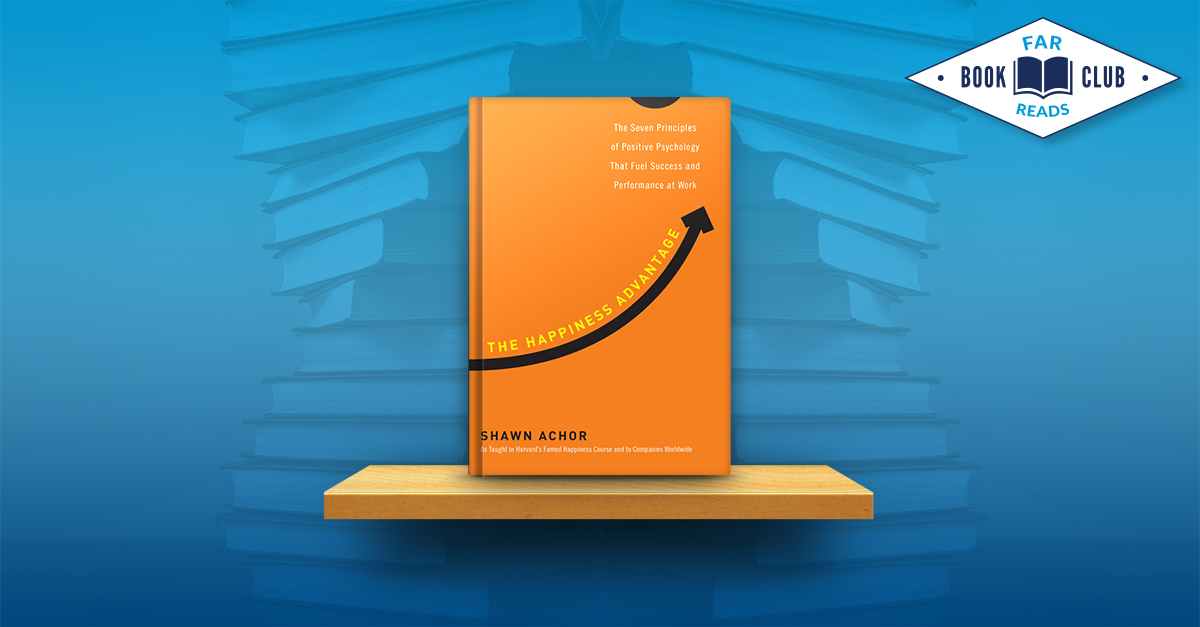
Our latest Far Reads book club pick was “The Happiness Advantage” by Shawn Achor. Here’s our recap.
Who Selected It
Brian Gorman
Why We Selected It
The clients we work with depend on us to deliver quality products that help them meet their goals. Because we believe that a happy team is a productive, engaged team that delivers exceptional results for our clients, we feel we owe it to them to pay attention
to and nurture our collective happiness.
We wanted to see how The Happiness Advantage could help us do just that.
What It’s About
The Happiness Advantage flips the idea of how success and happiness are related on its head. The traditional idea of happiness is that it comes as a result success. However, research shows, and Achor discusses, how it’s the other way around: happiness
leads to success.
Before we got started, Natalie shared this poignant story, a classic parable by by Heinrich Böll.
An American businessman was standing at the pier of a small coastal Mexican village when a small boat with just one fisherman docked. Inside the small boat were several large yellowfin tuna. The American complimented the Mexican on the quality of his fish.
“How long did it take you to catch them?” The American asked.
“Only a little while.” The Mexican replied.
“Why don’t you stay out longer and catch more fish?” The American then asked.
“I have enough to support my family’s immediate needs.” The Mexican said.
“But,” The American then asked, “What do you do with the rest of your time?”
The Mexican fisherman said, “I sleep late, fish a little, play with my children, take a siesta with my wife, Maria, stroll into the village each evening where I sip wine and play guitar with my amigos, I have a full and busy life, señor.”
The American scoffed, “I have a Harvard MBA and could help you. You should spend more time fishing and with the proceeds you could buy a bigger boat, and with the proceeds from the bigger boat you could buy several boats. Eventually you would have a fleet of fishing boats.”
“Instead of selling your catch to a middleman you would sell directly to the consumers, eventually opening your own can factory. You would control the product, processing and distribution. You would need to leave this small coastal fishing village and move to Mexico City, then LA and eventually NYC where you will run your expanding enterprise.”
The Mexican fisherman asked, “But señor, how long will this all take?”
To which the American replied, “15-20 years.”
“But what then, señor?”
The American laughed and said, “That’s the best part. When the time is right you would announce an IPO (Initial Public Offering) and sell your company stock to the public and become very rich, you would make millions.”
“Millions, señor? Then what?”
The American said slowly, “Then you would retire. Move to a small coastal fishing village where you would sleep late, fish a little, play with your kids, take a siesta with your wife, stroll to the village in the evenings where you could sip wine and play your guitar with your amigos…”
Lessons Learned
There were so many great lessons in The Happiness Advantage. Here are a few of the most poignant:
- Being primed for happiness improves performance—give yourself a jolt of happiness before entering a stressful situation.
- It takes about 3 (some say 6) positive comments, experiences, or expressions to fend off the languishing effects of a single negative one.
- We tend to miss what we're not looking for. Our brains easily get stuck in patterns of viewing the world. The better we get at scanning for the negative, the more we miss out on the positive.
- Feeling that we are in control, that we are master of our own fate at work and at home, is one of the strongest drivers of both well-being and performance.
- If we study merely what is average, we will remain merely average.
- We become more successful when we are happier and positive.
- Social relationships are the single greatest investment we can make toward happiness.
- Our failures are opportunities for success. Sometimes failure is what drives us forward.
Our Favorite Quote
It’s hard to choose just one, but this block pretty well sums up the primary message of the book:
“Conventional wisdom holds that if we work hard we will be more successful, and if we are more successful, then we’ll be happy. If we can just find that great job, win that next promotion, lose those five pounds, happiness will follow. But recent discoveries in the field of positive psychology have shown that this formula is actually backward: Happiness fuels success, not the other way around. When we are positive, our brains become more engaged, creative, motivated, energetic, resilient, and productive at work. This isn’t just an empty mantra. This discovery has been repeatedly borne out by rigorous research in psychology and neuroscience, management studies, and the bottom lines of organizations around the globe.”
How We’re Applying What We Learned
Moving forward, each team member has a slightly different approach to applying what we learned. As a team, we’re working on bringing our positive selves to meetings, looking on the bright side, and using happiness as a driver of our success.
For our next Far Reads book, we’re getting open and honest with
Radical Candor by Kim Scott. Look for a recap in a few months!